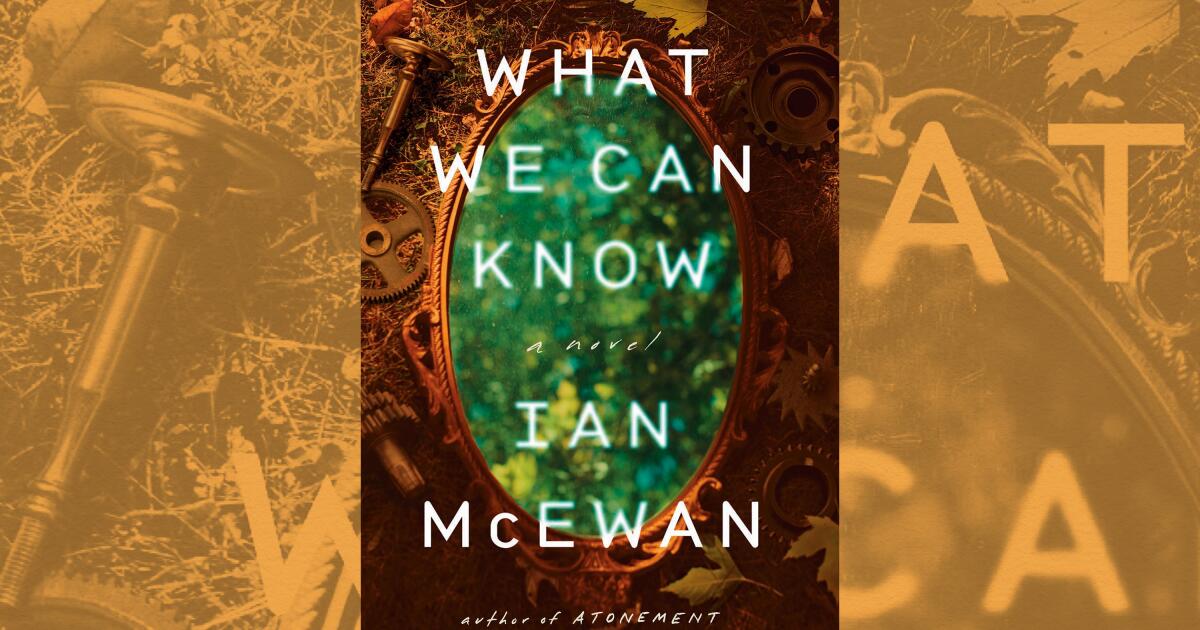
In our fiercely tribal and divisive culture, when consensus is illusory and we can’t seem to agree on even the most fundamental facts, the notion of shared history as a societal precept has left the building. But if we are indeed living in a post-truth era, Ian McEwan is here to tell us that things will only get worse.
In his bracing new time bender of a novel, the great British novelist posits that the past is irretrievably past, particularly in matters of the human heart, and any attempt by historians or biographers to wrench it into the present is folly — or in the case of this novel’s protagonist Thomas Metcalfe, intellectual vanity.
Metcalfe is an associate humanities professor and a researcher living in England in the 22nd century (2119, to be exact) who has taken it upon himself to unlock the mystery of a poem called “A Corona for Vivien,” written in 2014 by a deceased literary eminence named Francis Blundy, a poet whose genius, we learn, once rivaled that of Seamus Heaney. The poem was composed for his wife Vivien’s birthday dinner in October 2014, an evening that has taken on mythic proportions in certain academic circles in the intervening years. It even has a name: The Second Immortal Dinner, in which Blundy for the first time read his corona, a poem composed as a sequence of sonnets, that had been lost long ago.
In Metcalfe’s hothouse literary universe, Blundy’s poem is important because it is a revenant. In the intervening years, interpretive speculation about it has run rampant. Some have called it a warning about climate change. Others say Blundy was paid a six-figure sum by an energy company to suppress the poem. Only fragments of it exist, certain fugitive lines that appear in correspondence between Vivien, Blundy and Blundy’s editor, Harold T. Kitchener. Metcalfe has taken it upon himself to find the long-lost document, allegedly written by Blundy on a vellum scroll and buried by Vivien somewhere on Blundy’s property.
Metcalfe’s task is greatly complicated by the fact that he lives in a future world where much of the planet has been either immolated or else submerged underwater by a nuclear cataclysm that McEwan calls “The Inundation.” There has also been a mass migration — “The Derangement” — in which millions, deprived of resources and land, have been driven from England into Africa. Entire cities have been lost, “the land beneath them compressed and lowered, so they did not drain, but persisted like glacial lakes.” Whatever repositories of learning that weren’t destroyed now exist on higher ground in the mountains, where the “knowledge base and collective memory were largely preserved.”
The built environment has eroded, but fortunately for Metcalfe, the digital world of the past is intact. Biographers from 2000 onward, McEwan writes, are “heirs to more than a century of what the Blundy era airily called ‘the cloud’ ever expanding like a giant summer cumulus, though, of course, it simply consisted of data-storage machines.” Here in the cloud are the many hundreds of emails and texts from Blundy, his wife and their circle, allowing Metcalfe the satisfaction of knowing he can piece together the events of the epochal dinner party down to granular details: cutlery used, foods prepared, toasts proffered.
What Metcalfe knows of the Blundys’ life together can be gleaned from the 12 extant volumes of Vivien’s journals. From the journals Metcalfe has surmised that Vivien, herself a brilliant literary scholar and teacher, had willfully lived out her marriage under Blundy’s shadow, the dutiful handmaiden to a literary eminence. “She enjoyed producing a well-turned meal,” Metcalfe posits. “She was once a don, a candidate for a professorship. Abandoning it was a liberation. She always felt herself to be in control. But it had surprised her how … she had emptied herself of ambition, salary, status and achievement.”
Despite the pile-up of particulars, Metcalfe knows he must find the lost poem, that it is the keystone without which the story crumbles into insignificance. If he fails in this task Metcalfe, already feeling like an “intruder on the intentions and achievements” of Blundy, loses his mojo: his mission aborted, his career stalled.
But just when it seems as if Metcalfe, after a long and arduous journey across land and water, has discovered something significant, McEwan drops the curtain on that story, and rewinds the narrative 107 years, back to Vivien Blundy and her story. At first, the basic contours conform to Metcalfe’s version of events: Vivien did forsake her academic ambitions for Blundy, who did write a poem for her that he read aloud on her birthday, and so on.
But Metcalfe, as it turns out, has the details right and the motives all wrong, never more so than when McEwan reveals the fact of a murder, conceived in such a way that no snooping academic could ever unearth it. Emails are composed yet remain unsent. Digital correspondence is deleted into the ether, sneaky evasions that are beyond the biographer’s grasp. Metcalfe’s thesis is driven by a romanticized notion of Blundy’s life, but as McEwan slowly and carefully reveals, his poem, ostensibly a “repository of dreams,” more closely resembles a passive-aggressive act. As for Vivien, the narrative she has proffered in her journals is far from the whole story. She is resentful of Blundy, thwarted in her career, simmering with resentment. Despite his scholarly assiduity, Metcalfe is moving down an errant path that will never square the facts with lived experience.
Of course, facts are important, but they don’t necessarily reveal anything; it is the biographer’s folly to ascribe deeper meaning to them, to extrapolate truth from a disparate series of events. Metcalfe’s pursuit of revelation in a single lost poem is magical thinking, a relentless grasping for a chimera. McEwan’s elegantly structured and provocative novel is a strong argument for how little raw data, or even the most sublime art, can tell us about humans and their contrary natures.



